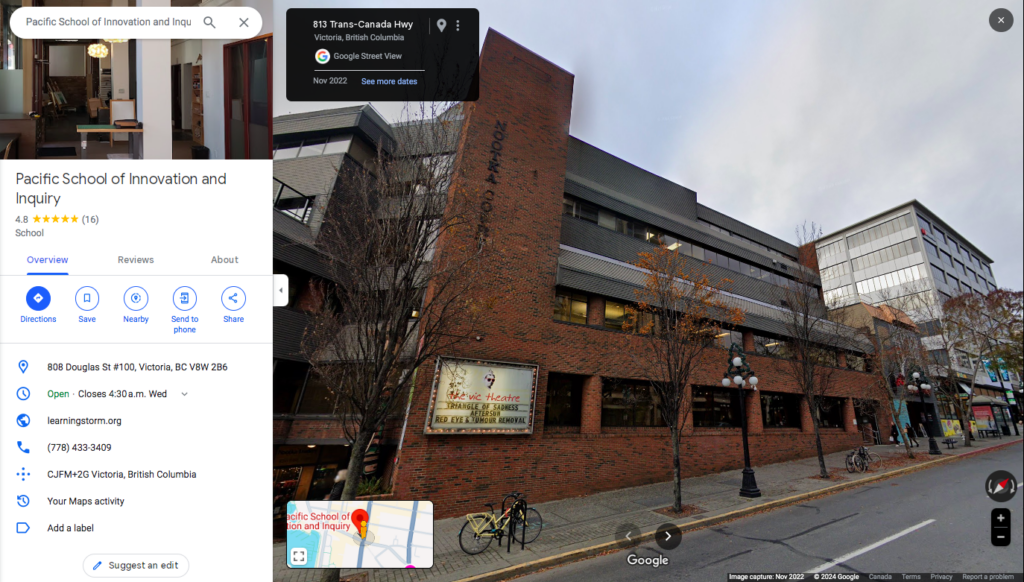It turns out we have our very own “High Tech High” (throwback to week 1) right here in Victoria and it’s called the Pacific School of Innovation and Inquiry (PSII). We were lucky enough to have Jeff Hopkins, founder of PSII, come speak with us about the unique schooling experience they offer there.
Aligning well with the humanistic learning theory in education, PSII gives its students the maximum amount of choices and creates an environment where quality engagement can be fostered to further their learning. Here, the student is central and active in the learning process and the teacher serves more as a guide. The teacher-guide recognizes that learning looks different for everyone (Vienneau, 2017). To illustrate this Jeff claimed that the spiral curriculum approach utilized by conventional schools was actually ill-suited for some students because it would not be working them in their zone of proximal development (ZPD). He elaborated by saying if students are not working here, whether it be they are stuck in their comfort zone or being pushed too far, they will “check out” and fail to learn.
Even more effective as a means of avoiding students “checking-out” is the way that PSII operates using personalized curriculums which are generated by students’ questions. This is where the inquiry part of the school’s name comes into play. This reminded me of a point made by the language teaching method called Community Language Learning, which stresses the value of using topic-based learning where students nominate what they wish to speak about in order to ensure their participation (Richards & Rodgers, 2001).
I plan to use inquiry-based learning in my classroom so students stay motivated to learn French. This will be important since many people simply aren’t keen to learn a second language to begin with.
I found it really inspiring to know how well inquiry-based learning works at PSII so I did a little research of my own and found this Youtube video on the approach. It does a good job summarizing the protocol and highlighting some strengths by referencing Harry Potter and the Order of The Phoenix. I love this film and a good analogy so that was just a bonus. The video compares standardized teaching practices to Hogwarts under the rule of Dolores Umbridge, and inquiry-based teaching to Dumbledore’s Army, the secret organization Harry started to resist Umbridge’s restrictive regime. Check it out if you like: https://www.youtube.com/watch?v=QlwkerwaV2E
Finally, being that I found the whole concept of this school to be incredible, I wanted to know how well it was received by the public so I searched its name in Google then clicked in the “News” tab. Interestingly the second result was an article that gave a list ranking all the best schools in Victoria. To my surprise, PSII was ranked the third lowest! This made me wonder what method was used to evaluate the schools… and apparently one of the main means for doing so was based on Foundation Skills Assessment (FSA) test scores. This disappointed me since it means our societal obsession with standardization and achievement (as measured by grades) will rob countless children of having really meaningful and engaging schooling experiences because people may see places like PSII as inferior. I hope people will be willing to think critically and realize that success can be measured in many different ways. https://victoriabuzz.com/2018/04/the-fraser-institute-released-its-ranking-of-elementary-school-in-victoria/
To conclude, I would like to express my gratitude to Jeff for opening my eyes to the fact that not all teaching opportunities in this city look the same, and that numerous different routes await us as future educators if we so desire.
References:
Vienneau, R. (2017). Apprentissage et enseignement (3rd ed.). Gaëtan Morin Éditeur.
Richards, J. C., & Rodgers, T. S. (2001). Community Language Learning. In Approaches and Methods in Language Teaching (pp. 90–99). Cambridge University Press.
PS. I have also attached a screen capture which I took today on Goggle Maps since it shows the building that PSII is located in. If you’re like me then you might have passed this building on Douglas Street dozens of times and never gave it a second look. Now I will wonder about all the cool things going on inside every time I see it.

Sorry, but comments are not enabled on this site.